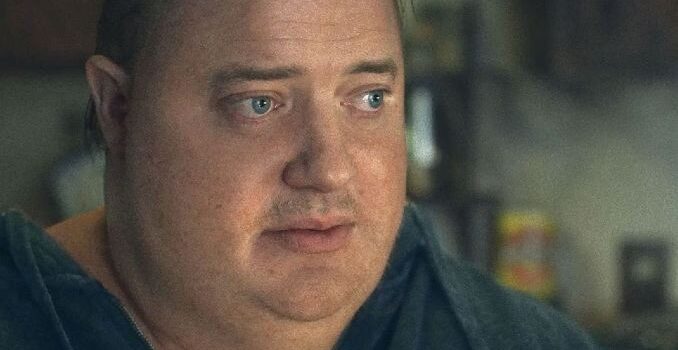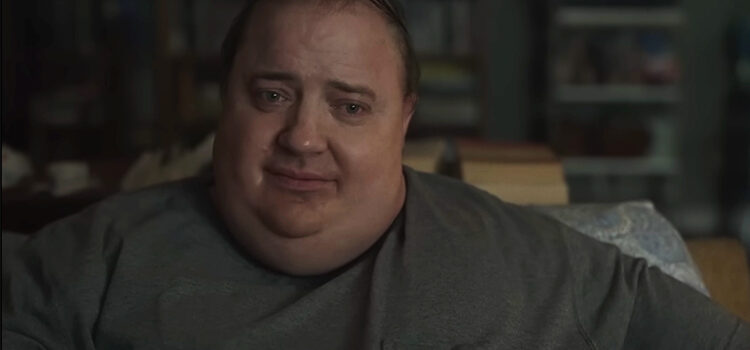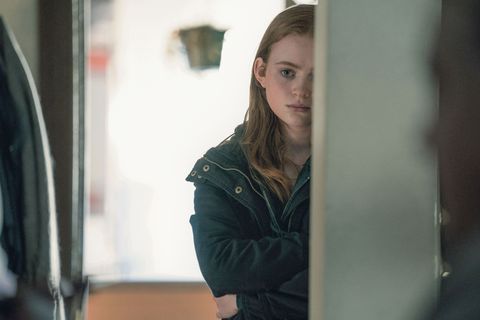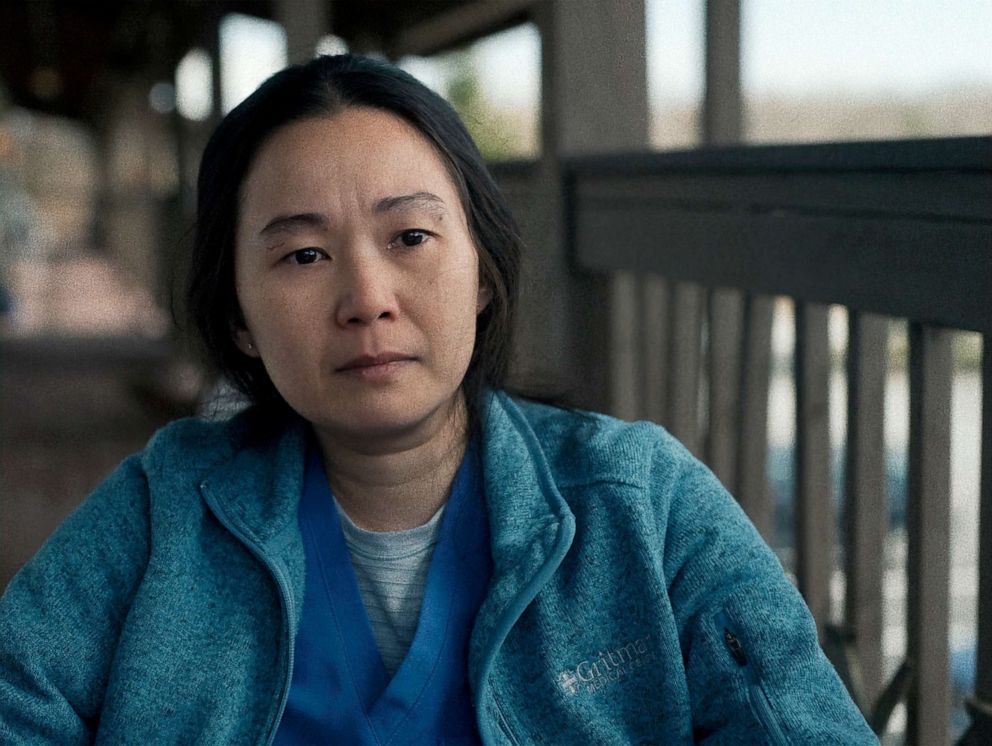By Alex McPherson
An exhausting film filled with compelling performances, director Darren Aronofsky’s “The Whale” exerts a vice-like grip throughout, reveling in both discomfort and emotional catharsis.
Adapted from a play of the same name by Samuel D. Hunter, who also wrote the screenplay, “The Whale” centers around Charlie (Brendan Fraser), a reclusive, morbidly obese English teacher giving remote lessons within a fetid apartment in Idaho during the 2016 presidential primaries.
Suffering from congestive heart failure, and refusing medical care, Charlie doesn’t have much time left — prompting this kind yet tormented soul to reflect on his mistakes and seek some semblance of inner peace. Above all else, he wants to reconnect with his estranged teenage daughter, Ellie (Sadie Sink), who prickles with rage and resentment at not only him, but the world at large.
Eight years prior, Charlie abandoned Ellie and his then-wife, Mary (Samantha Morton) to be with his gay lover, Alan, who later passed away, leaving Charlie reeling with grief and practically eating himself into the grave. Charlie is looked after by his friend, Liz (Hong Chau), a nurse who shares a past with him and who is battling her own all-encompassing demons.
As the days tick by, Charlie frequently refers back to an essay one of his students wrote about “Moby Dick” — a blunt interpretation whose honesty affects him to his very core.
The stage is set for in-your-face melodrama, and “The Whale” certainly tries to make viewers feel as much as possible. Yet, despite the script’s heavy-handedness and cinematic flourishes that detract from its noble messages, Aronofsky’s film soars on the undeniable power of its performances. Fraser is marvelous, bringing tenderness to a character too often put in extreme situations.
Indeed, Charlie is seemingly at battle with the film itself — a tug-of-war between empathy and cruelty. Aronofsky — known as a boundary-pushing filmmaker — has no qualms about putting him through the ringer from beginning to end. Despite a dreary, limited setting (enhanced by a claustrophobic aspect ratio), the near-constant punishment from the outside world, and his untenable condition, Charlie remains hopeful that he can help Ellie restore some faith in herself to weather their harsh world, and thereby right the greatest wrong in his own tragic life.
With a fatsuit and strong makeup work, Fraser’s first impression is startling (even played to “horror” lengths at certain points), but his earnest line delivery brings sensitivity and sly humor to a character otherwise harshly defined. It’s difficult to overstate just how effective Fraser is here — even the most clumsy, heavy-handed soliloquies feel impactful thanks to his raw skill as a performer and his ability to convey meaning that isn’t always there in the screenplay.
The rest of the cast is exceptional as well, particularly Chau, who brings much-needed groundedness to the film’s increasingly melodramatic plot developments. Liz is a high-strung, enabling, and grief-stricken person herself — doing what she can for Charlie, while also neglecting to appreciate his last wishes.
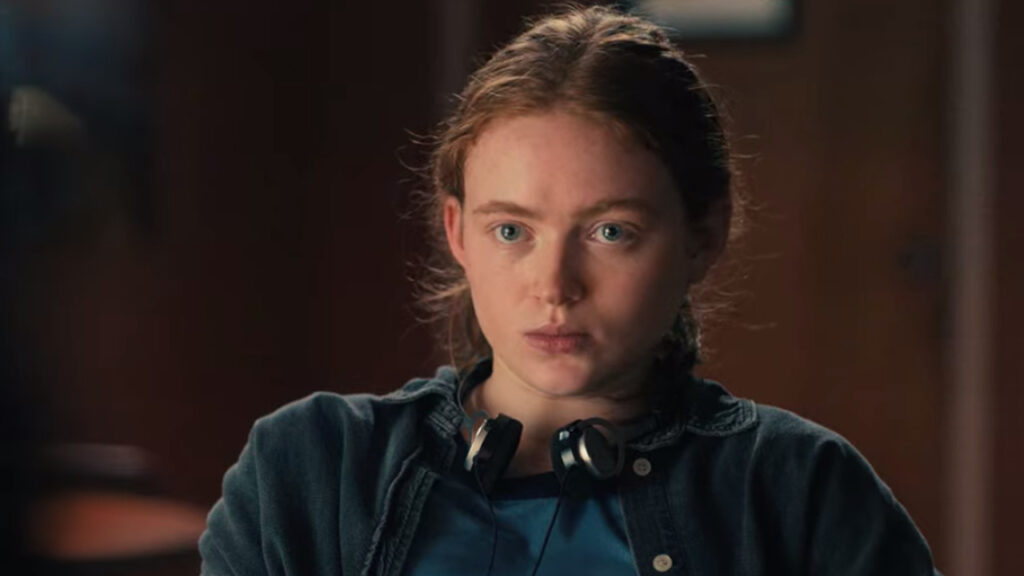
Sink, on the other hand, is downright scary as Ellie, a teenager warped by cynicism and insecurity. It often seems like Sink, and the script, have Ellie dialed up to 11, which lessens the character’s authenticity and leans into exaggeration. Still, in the few moments where Ellie isn’t verbally abusing Charlie (or worse), viewers get glimpses beneath the facade, where some warmth and compassion remain.
Also worth mentioning is Ty Simpkins, who plays Thomas, a church missionary who keeps showing up at Charlie’s doorstep and wants to “save” him before the end-times. Like most of the people Charlie interacts with, Thomas doesn’t have his best interests at heart, and “The Whale” emphasizes Charlie’s personal salvation over prejudiced, preordained constraints.
Aronofsky’s film is far less successful, though, in its translation from stage to screen. This isn’t a subtle film by any means, and blunt symbolism abounds — notably in how Charlie’s weight can function as a metaphor for his regrets, and how the film paints parallels between his body and that of the White Whale in “Moby Dick.” Moments where Aronofsky and cinematographer Matthew Libatique showcase the depths of Charlie’s desperation stand out as unnecessary and demeaning, inserted for shock value at his expense.
Ironically, the sequences where “The Whale” is most like a stage-play are where it works best — pleading for viewers’ sympathy, sacrificing emotional nuance, and giving the ensemble plenty of opportunities to loudly declare their awards-worthiness. Strange though this dichotomy is, it remains engrossing.
Less than the sum of its parts, albeit absorbing throughout, “The Whale” is worth watching as an acting showcase and an examination of ideas in a dramatic framework that’s seemingly, fascinatingly at war with itself.
“The Whale” is a 2022 drama directed by Darren Aronofsky and starring Brenda Fraser, Sadie Sink, Hong Chau and Ty Simpkins. It’s rated R for some language, some drug use and sexual content and has a 1 hour, 57 minutes runtime. It opened in select theaters Dec. 21. Alex’s Grade: B
Alex McPherson is an unabashed pop culture nerd and a member of the St. Louis Film Critics Association.

